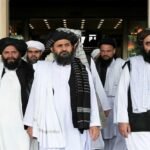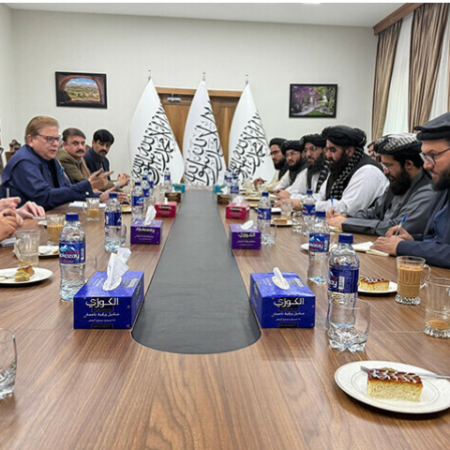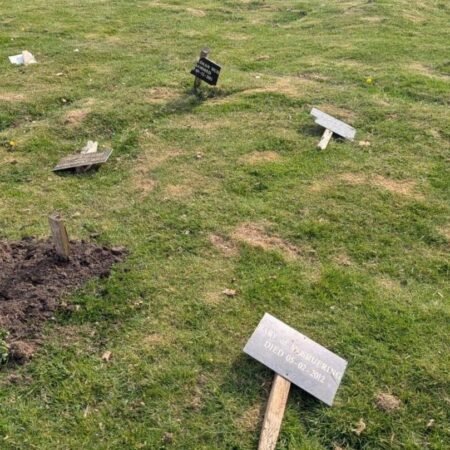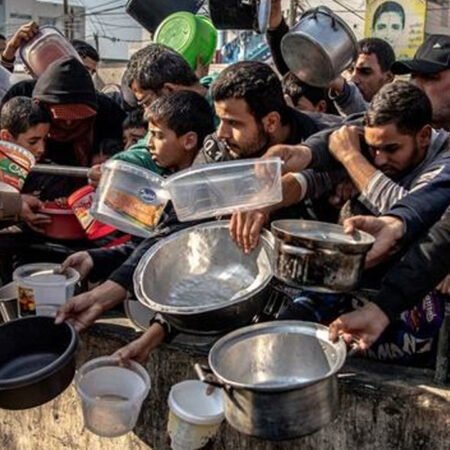
In an attempt to reach out to US President-elect Donald Trump, Arab and Muslim leaders are meeting in Saudi Arabia on Monday to discuss the wars in Gaza and Lebanon.
The Second Arab-Islamic Summit will also be addressed by Prime Minister Shehbaz Sharif, who departed for Riyadh on Sunday.
Speaking a day ago at the Council of Foreign Ministers Preparatory Meeting for the summit, Deputy Prime Minister Ishaq Dar said he hoped the new US administration would play a role in reviving Middle East peace efforts.
Plans for the conference were revealed by the Saudi foreign ministry in late October at a gathering of a new “international alliance” to advocate for the creation of a Palestinian state, which was also held in Riyadh.
It follows a year ago when leaders of the Cairo-based Arab League and the Jeddah-based Organization of Islamic Cooperation (OIC) met in Riyadh and denounced the actions of Israeli soldiers in Gaza as “barbaric.”
According to Anna Jacobs, senior Gulf analyst for the International Crisis Group think tank, leaders are probably thinking about Trump’s election last week for a second term in the White House this time.
“This summit is a great chance for regional leaders to communicate their desires for US engagement to the incoming Trump administration,” she stated.
“The message will probably be one of de-escalation, dialogue, and criticism of Israeli military operations in the area.”
According to data from Gaza’s health ministry that the UN deems credible, Israel’s retaliation campaign against Hamas’s attack on Israel last year has killed over 43,600 persons in the enclave, the majority of whom were civilians.
According to an AFP count of Israeli official data, 1,206 people were killed in the Oct. 7, 2023 attack on southern Israel, the majority of them were civilians.
Following the October 7 attack, Hezbollah, located in Lebanon, started firing into Israel. When Israel increased its airstrikes and pushed ground soldiers into southern Lebanon in late September, the routine cross-border interactions became more intense.
During more than a year of fighting, departing US President Joe Biden made sure that Washington continued to be Israel’s most significant military ally, despite criticism of the effects Israel’s military assault has had on civilians in Gaza.
“You can trust the Saudis.”
Trump’s actions during his first term demonstrated his even stronger commitment for Israel.
By acknowledging Jerusalem as Israel’s capital and relocating Washington’s embassy there, he went against the grain of the international community.
International law prohibits Israeli settlements in the occupied West Bank, which he also supported.
Trump was in charge of the Abraham Accords, which established diplomatic ties between Morocco, the United Arab Emirates, Bahrain, and Israel.
Trump developed close relations with the Gulf state while in power and has strengthened his commercial links to the area during the Biden administration, despite Saudi Arabia’s exclusion from those deals.
Saudi Arabia has put a stop to a US-brokered agreement that would have allowed it to recognize Israel in exchange for economic and security advantages, stating that diplomatic relations cannot exist without a Palestinian state.
Riyadh will use Monday’s summit to let the new Trump team know that it is still a reliable partner, according to Umer Karim, a Saudi politics expert at the University of Birmingham.
Trump stated that “if you want to extend American interests in the region, Saudi Arabia is your bet” and that he “can rely on the Saudis as being representatives of the Muslim world.”
Both those that recognize Israel and those that are adamantly opposed to its regional integration are members of the 22-member Arab League and the 57-member OIC.
At the Riyadh conference last year, there was debate over actions like as cutting diplomatic and economic ties with Israel and interfering with its oil supplies.
According to Karim, Monday’s post-summit statement will probably “strongly condemn Israel […] while also pushing for greater American leverage and diplomacy on the issue.”
Ebrahim Raisi, the president of Iran at the time, attended the November 2023 meeting, demonstrating the shift in regional diplomacy since Trump’s last term.
Following seven years of strained relations, Iran and Saudi Arabia declared a rapprochement facilitated by China in March 2023.












No Comment! Be the first one.